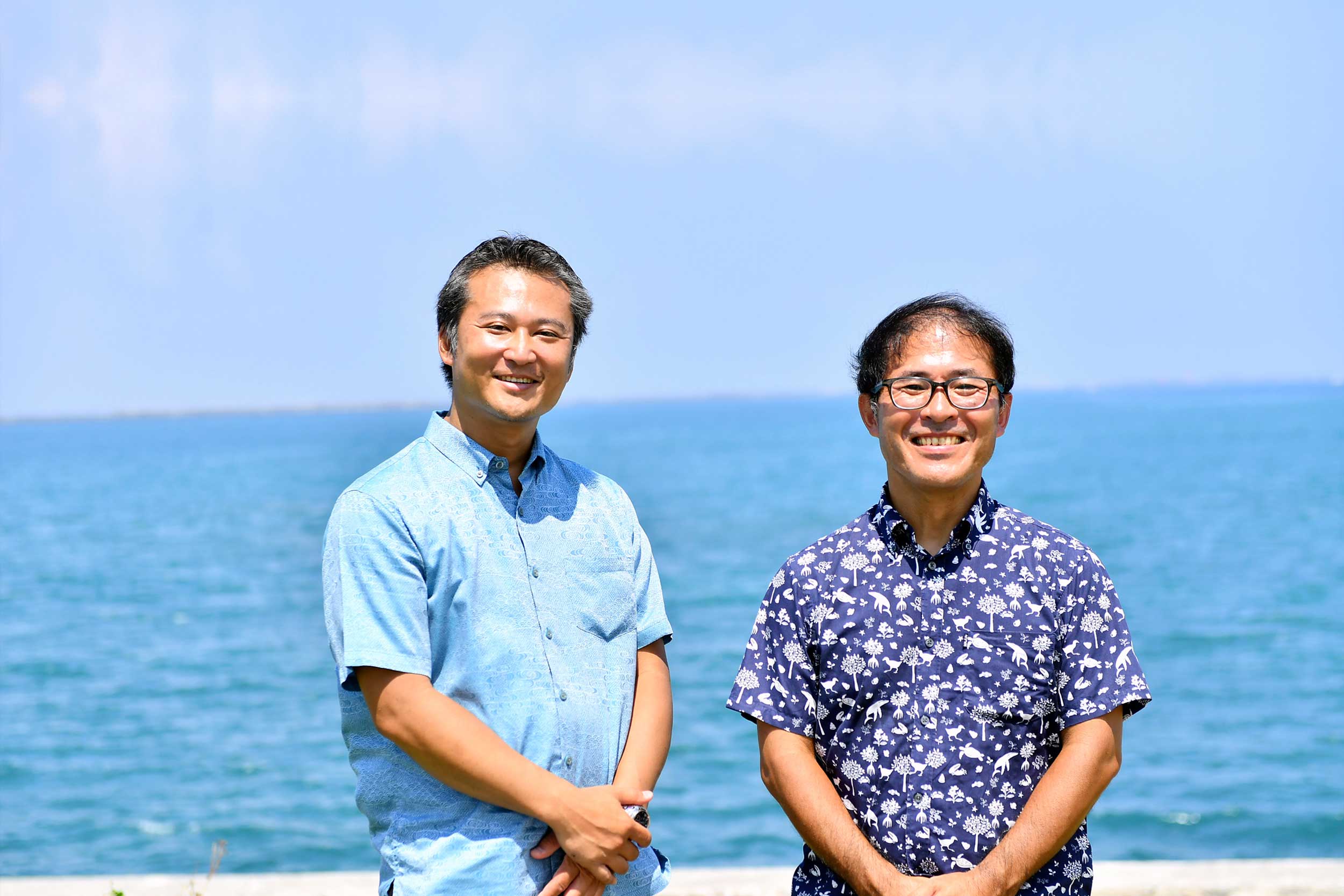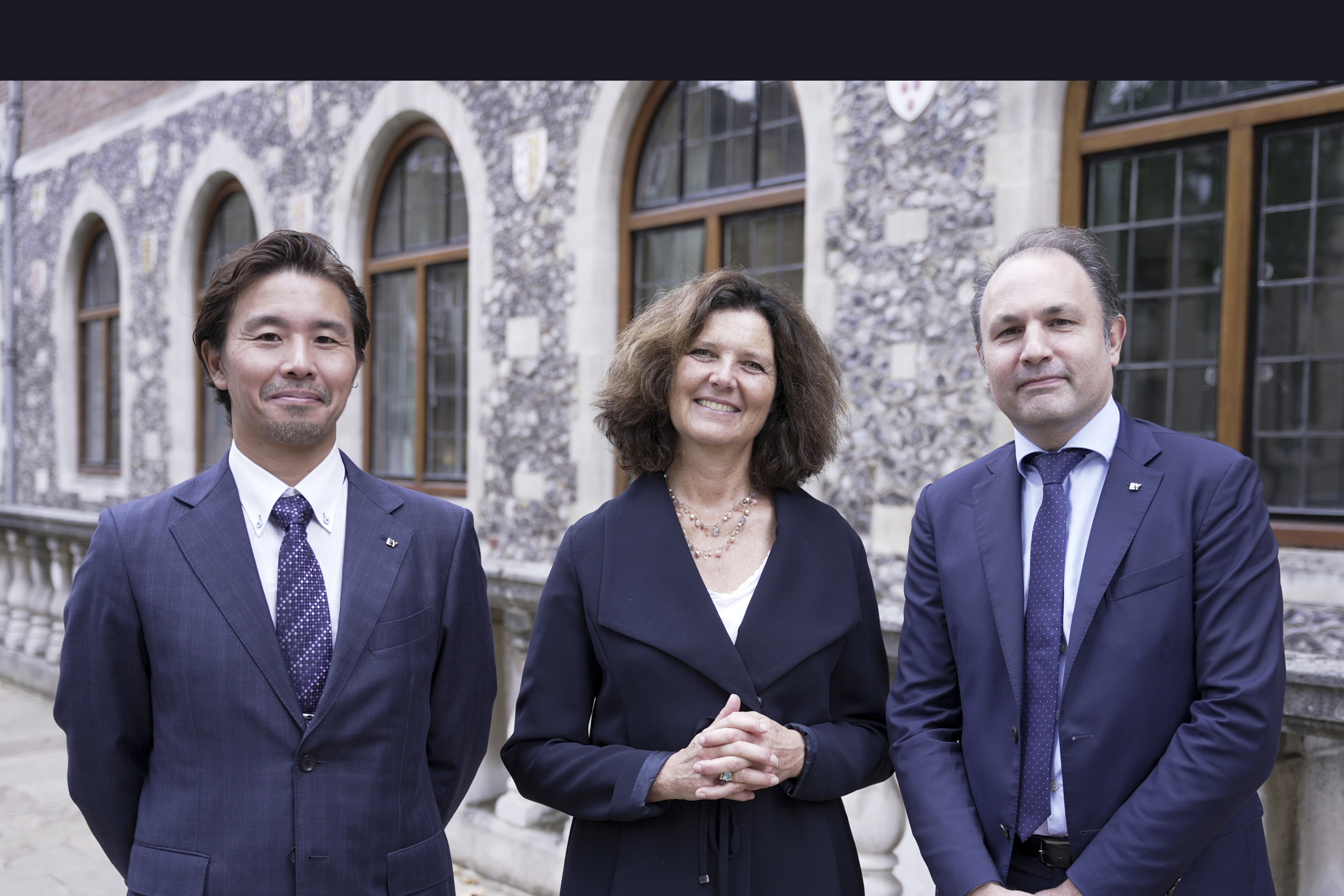EY refers to the global organization, and may refer to one or more, of the member firms of Ernst & Young Global Limited, each of which is a separate legal entity. Ernst & Young Global Limited, a UK company limited by guarantee, does not provide services to clients.

Long-term value (LTV) discussion series
Co-creating long-term value through an alliance
In brief
- Sustainability and ESG management have become keywords for our clients. Management should be proactive about measuring and making visible the data generated by activity in these areas.
- The detailed, real-time data generated by Microsoft’s innovative services overcome previously difficult barriers to visualize sustainability. EY Consulting also uses this data to support ESG management initiatives by our clients.
- The collaboration between Microsoft and EY leverages technology and business to accelerate action in the areas of sustainability and ESG management in the Japanese market
Microsoft continues to lead the technology industry with its cutting-edge, innovative products and services. EY is recognized as a reliable professional services provider in the areas of audit and assurance, consulting and advisory. The two share the same enthusiasm for contributing to society through business, and are working hand in hand to transform how businesses approach sustainability and ESG.

Mr. Motoaki Nishiwaki
Evangelist
Microsoft Japan Co., Ltd.

Norikazu Tabata
Technology Consulting Leader; Microsoft Practice Leader; Partner
EY Strategy and Consulting Co., Ltd.

Section 1
Executives need to initiate change for ESG management
Companies need to make environmental issues visible by clarifying the end goal and the means to achieve it. Sustainable management is made by taking tangible steps forward.
Tabata: EY has declared its purpose as delivering long-term value to clients and society. In recent years, as seen in the Sustainable Development Goals (SDGs), efforts to create a sustainable society have been attracting increasing attention, and EY for its part is stepping up its efforts to tackle sustainability through support for clients with their ESG management initiatives and deploying IT solutions that make those initiatives visible.
Mr. Nishiwaki: Microsoft’s mission statement is to empower every person and every organization on the planet to achieve more. In the past, we prioritized raising productivity and introducing comfortable ways of working. However, changes in society in recent years have led us to think about sustainability in everything we do. Our specific goals are carbon negative, water positive and zero waste. The idea is to become a positive force in the dynamic. For instance, absorbing carbon instead of just achieving net zero, and supplying water rather than just consuming it.

Tabata: I find Microsoft’s measures to recover all the carbon emitted since creation of the company to be an incredibly ambitious goal for the future.
Mr. Nishiwaki: To pursue sustainability systematically, you need to measure and quantify data. An entity has to be able to precisely measure and identify carbon dioxide emissions and the use of water not only in the present but also in the past. On top of that, we have committed to give back to Earth in our sustainability practices.
Tabata: The impression that I get from Microsoft’s mission statement is your commitment to embracing your social responsibilities as a platform provider. Management issues and supply chains are becoming more global and complex. If users and clients around the world can play a part in creating a sustainable society just by using Microsoft solutions, it would be the ideal outcome which Microsoft, as a platform provider, is working to achieve. I feel that the mission of Microsoft, which has high ambitions, and the EY purpose of Building a better working world, are very alike - they resonate with each other.
Mr. Nishiwaki: It’s not enough to just achieve our own goals. It’s important that we translate that into achieving the world’s goals. However, as an evangelist, I talk to lots of corporate executives, and I’m surprised by the different awareness levels about sustainability issues. For example, all companies, regardless of their size or sector, have the same views regarding digital transformation (DX). When it comes to sustainability, I see an enormous gap between the companies that are very interested and not at all interested. Many companies struggle with how to incorporate sustainability into their management. They need to split the concepts into the end goal and the means. They should take tangible steps to carry out sustainable management, not pay lip service to it. Environmental issues are hard to visualize unless they’re measured, so to tackle them, the management needs to work on making them visible.
Tabata: Efforts in the areas of sustainability and ESG are completely different from conventional management tools, which are based on financial data. You can either think that sustainability is a trend from Europe to follow passively, or see it is a business opportunity to flex your management muscles. I think these two attitudes will result in totally different outcomes within a few years.
Mr. Nishiwaki: The drawback to sustainability measures is that, in most cases, companies have to start by reporting a negative figure. Management will be tested for its ability to overcome this. Most businesses involve various stakeholders such as suppliers and transporters. As a result, the entire supply chain needs to be considered when addressing sustainability.
Tabata: Yes. A platform is essential to do that, and that is where you come in. ESG management involves not only sustainability data in an environmental sense, but also human rights, working environments, and the proportion of female managers and other facets of non-financial information. We need a platform that can measure this so we have high expectations for the cloud service that Microsoft is aiming to offer as a platform for balancing these factors and driving the improvement process.
Mr. Nishiwaki: ESG management no longer matters only to investors. Japan has caught up with the rest of the world in that it is a vital factor in being chosen by the market. Environmental and sustainability issues are no longer a risk event on the horizon, but for everyone on earth including Generation Z. It is happening here and now. It is clear that management which fails to address this shift in the market risks its survival.

Section 2
Impact of cloud service-based data visualization on management
Cloud service enables you to gather and visualize data from the frontline, and have full access to real-time information about your business. Finding out how much energy your business consumes can make sustainability directly relatable to decision making.
Tabata: Support from technology is indispensable for properly evaluating and promoting corporate efforts in the areas of sustainability and ESG management. In June 2022, Microsoft began offering its new solution: Microsoft Cloud for Sustainability.

Mr. Nishiwaki: Action on sustainability starts with visualizing and measuring environmental impact and the effect of reducing it. A platform is essential for efficient use of data. Microsoft’s service allows frontline data from various types of business to be collated and made visible in order to confirm the situation for the business. As an example, let’s say that you used a cloud service for an online meeting. With Microsoft’s cloud service, you would get statistics detailing how your use of that cloud service translates to energy usage, in terms of crude oil and natural gas. We believe that compiling annual data for each factory and business unit is insufficient. You will only be able to view sustainability as something that relates directly to you, and sustainability will only become firmly rooted in your organization, if your own business and the results are linked.
Tabata: So, a platform that both helps sustainability measures and is itself sustainable. I think that’s a challenge that only Microsoft can handle, backed by experience of offering digital solutions as social infrastructure. ESG is an area where information has little value unless there are the players and data to create a visible dataset. Cloud-based solutions are a great fit for handling vast amounts of ESG data.
Mr. Nishiwaki: We would like more companies to use our platform to make society as a whole more visible. Ultimately, this will help society as a whole become more sustainable―which is our goal.
Tabata: Most EY clients operate globally. I would like to know more about your Planetary Computer initiative that helps to globalize sustainability and ESG management efforts.
Mr. Nishiwaki: Sustainability must be assessed on a global scale, so it’s essential to know about any changes in the environment, such as deforestation and changes in precipitation. The idea behind Planetary Computer is to create a model for accurately viewing vast quantities of data and performing administrative tasks such as updating the data. Collecting data from around the world in real time and loading it into the platform means that anyone can find out about the current state of the planet, and easily make comparisons with historic data. At present, we are working with the Japan Aerospace Exploration Agency (JAXA) and the National Aeronautics and Space Administration (NASA), and various European organizations to store, model, and utilize data on environmental changes in each location.
Tabata: I’m sensing that you want the data to be widely used as a public good. Previously inaccessible big data will now be available to companies for business decision-making and on the operational frontline, so we expect it to have a big impact in terms of driving change across a company’s entire business.

Section 3
Management and technology can both drive innovation
The EY-Microsoft Alliance will make it possible to support clients from both a management and a technology perspective, and will contribute to sustainability.
Tabata: Microsoft, the technology provider, and EY, the business supporter, are the ideal match for bringing synergy in every aspect of sustainability and ESG management. EY and Microsoft have recently announced an expanded alliance to help businesses achieve net-zero goals.
Mr. Nishiwaki: We interact with clients from a technology perspective but, for management to share their sustainability message, the strength of EY’s consulting skills are crucial to this conversation. In discussions with corporate executives, it will be increasingly essential to persuade them that ESG is important from a business perspective. We will be able to interact with clients on both the management and technology fronts to facilitate sustainability. This is a big advantage of the collaboration between EY and Microsoft.
Tabata: Here at EY, we believe that three perspectives are essential for transformation: humans@center (positioning humans at the center), technology@speed (quickly deploying technology), and innovation@scale (promoting innovation on a large scale). Microsoft’s technology performs at outstanding speed and scale. In addition, clients expect EY to take part in the transformation of their workforce. We translate the language of technology into the language of business and communicate it to many companies. EY has its roots in audit, so assurance of disclosure data and carbon-related tax services are within our domain of expertise. In fact, there are countless areas where Microsoft and EY can collaborate.

Tabata and Mr. Nishiwaki discussing their future vision for the EY-Microsoft Alliance
Mr. Nishiwaki: I believe that we can be of help in a variety of settings, from large to small. For example, the broader area of thinking how to make use of outer space, and in the narrower area of helping to improve the well-being of working people. Wherever sophisticated business decisions and technology are needed, where there are issues to overcome, we can help. EY’s role is to act as a catalyst in offering clients insight into accounting, business management, and risk management, while Microsoft will be the technology foundation to support it. This is how the alliance will spark innovation. Japan is regarded as moving slowly on sustainability and ESG management. Let’s put innovation to work in accelerating sustainability in Japan.
Tabata: Now that we have access to Microsoft’s leadership in cutting-edge technology and data, we will need to match the pace at EY and constantly transform ourselves. Our alliance with Microsoft is one of the most powerful assets available to us, and it is my mission to come up with services that make full use of it.
Press release
Publication of EY Japan Integrated Report 2022
EY Japan (headquartered in Chiyoda, Tokyo; Chairperson & CEO: Moriaki Kida), today released its annual integrated report, which describes its accomplishments in the creation of sustainable long-term value during FY22 (July 2021 - June 2022).
EY achieves highest growth in nearly two decades, reports record global revenue of US$45.4b
LONDON, 21 SEPTEMBER 2022. EY today announces combined global revenues of US$45.4b for the financial year ending June 2022 (FY22), an increase of 16.4% in local currency (13.7% in US dollars).
EY Japan Launches New Scheme to Develop Neurodiversity Human Resources
EY Japan (Chiyoda-ku, Tokyo; Chairperson and CEO: Moriaki Kida) is proud to announce the launch of the Diverse Abilities Center, an organization that enables individuals to experiment with flexible work styles to suit their individual neurodivergent needs while acquiring professional skills and a career.
Our latest thinking
People Story To be an organization where individuals thrive and which demonstrates the power of collaboration In this section, we feature a dialogue between three EY professionals, each with global experience in different arenas: tax, audit and consulting. They share their thoughts on EY’s approaches for global collaboration and how the EY purpose and values shared across our member firms impact our clients and other stakeholders.
Okinawa takes the lead in tourism DX - how local innovation is driving long-term value
Capabilities in the areas of DX, data science and design thinking are vital to the structural transformation that tourism in Okinawa requires. This discussion highlights the potential of tourism to contribute to the promotion of human resources development and innovation which follow revitalization, and also deals with the future of the industry.
TNFD and EY working towards a market-led sustainable society
TNFD is accelerating sustainability initiatives through the market in order to tackle the serious global risks stemming from the loss of natural habitats. As a member of the taskforce, EY provides support for activities designed to bring about a “nature positive” world.
Summary
Microsoft embraces its social responsibilities as a platformer by harnessing the power of technology to support sustainability. EY helps clients create long-term value through its approach to non-financial information. This global alliance of two businesses which share a common vision will make a huge contribution to creating a better, more sustainable society.








